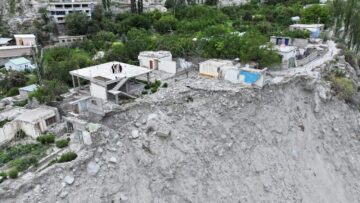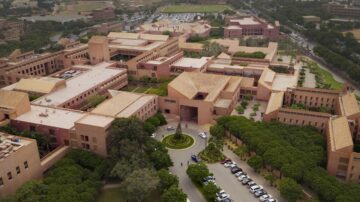Following the success of the Institute’s first film festival in the summer of 2002 , the IIS launched a follow-up series of screenings exploring representations of Islam, and religion more generally, in contemporary cinema. This year’s festival, showcasing six films, continues to explore the interplay of perceived tensions, negotiations and representations of Islam, both as a cultural and religious system, as it manifests itself in various cultures, societies and narratives.
Film can have the power to inform, explore, entertain and oftentimes critique a society’s values. The influence and visual currency of the cinematic form empowers it as a contemporary force in the presentation of ideas. Addressed by filmmakers from diverse backgrounds, the films come from a wide range of countries and offer different perspectives on the Muslim world, exhibiting the impact of religion on individual lives and communities.
In recent years, the critical acclaim and success of films from the Muslim world, primarily Iran and Morocco, have allowed values, ethics and narratives to be communicated through cinematic expression to those who normally would not have access to them. It has also challenged monolithic representations of Islam in the West and highlighted the differences in culture and expression amongst the world’s more than one billion Muslims. In the past, cinema and popular cultures have tended to move eastwards, from the West towards the Muslim world. We are now, more and more, seeing a dialogue of cultures and civilisations through cinema, literature, fashion, painting and other art forms.
The films showcased this year included:
The Warrior
Directed by Asif Kapadia
(UK, 2001, 86 mins)
Directed by the award winning Asif Kapadia, The Warrior is a sweeping mythical adventure story about a lone warrior’s spiritual journey from the deserts of Rajasthan to the snow-capped peaks of the Himalayas. Irfan Khan stars as the head of a small band of warriors in the employ of a tyrannical lord. A mystical encounter leads him to reject his violent life, but this decision comes at a devastating personal cost.
Baran
Directed by Majid Majidi
(Iran, 2000, 93 mins)
Lateef is a tea-boy on a building site where the majority of labourers are Afghan refugees, now working illegally in Iran. When one of the Afghans is injured, he is replaced by his son, Rahmat. But Rahmat proves too frail for construction work and so he and Lateef are made to switch jobs. The indolent Lateef is angry at first, until he discovers that Rahmat is actually Baran – a girl.
11’09’01
11 Directors
(UK, France, Morocco, 1998, 98 mins)
This film is a unique and extraordinary response to the catastrophic events in New York City that shook the world on September 11, 2001. Producer Alain Brigand invited 11 renowned international directors to look towards their own cultures, their own memories, their own stories and their own language and create a film lasting eleven minutes, nine seconds and one frame – 11’09’’01 – around September 11 and its consequences. The thought-provoking results – made with complete freedom of expression and in a spirit of complete equality – cover a diverse range of sensibilities and viewpoints and testify to the resonance of the event throughout the world.
Divine Intervention
Directed by Elia Suleiman
(France, Germany, Morocco, Palestine, 2002, 93 mins)
With witty visual gags, comic vignettes and moments of spectacular fantasy, Divine Intervention portrays the mood of escalating conflict in the Middle East with wicked and subversive humour. Palestinian director Elia Suleiman himself plays the central character who cares for his ailing father in Jerusalem whilst conducting an affair with a Palestinian woman living in Ramallah. Barred from moving between the two cities, the lovers are forced to share their intimate moments in the shadow of an Israeli army checkpoint, from where they observe the daily feuds between the troops and the civilians.
Hideous Kinky
Directed by Gillies MacKinnon
(UK, France, Morocco, 1998, 98 mins
Based on a semi-autobiographical novel by Esther Freud, Hideous Kinky is an evocative piece set in the early 1970s with Julia escaping grey London and a failed relationship. With her two daughters, aged six and eight, she heads for Morocco in search of adventure, escape and enlightenment. The young girls enjoy the colour and life of Marrakech, but the city has less to offer their penniless mum. It is only when Julia meets a local street performer that her life is transformed.
Taste of Cherry
Directed by Abbas Kiarostami
(Iran, 1997, 95 mins)
Winner of the 1997 Palme D’or at Cannes, Taste of Cherry is an emotionally complex meditation on life and death. Mr Badii drives through the hilly outskirts of Tehran looking for someone to bury him if he commits suicide. A soldier, an imam and a taxidermist all get involved in the dilemma.






